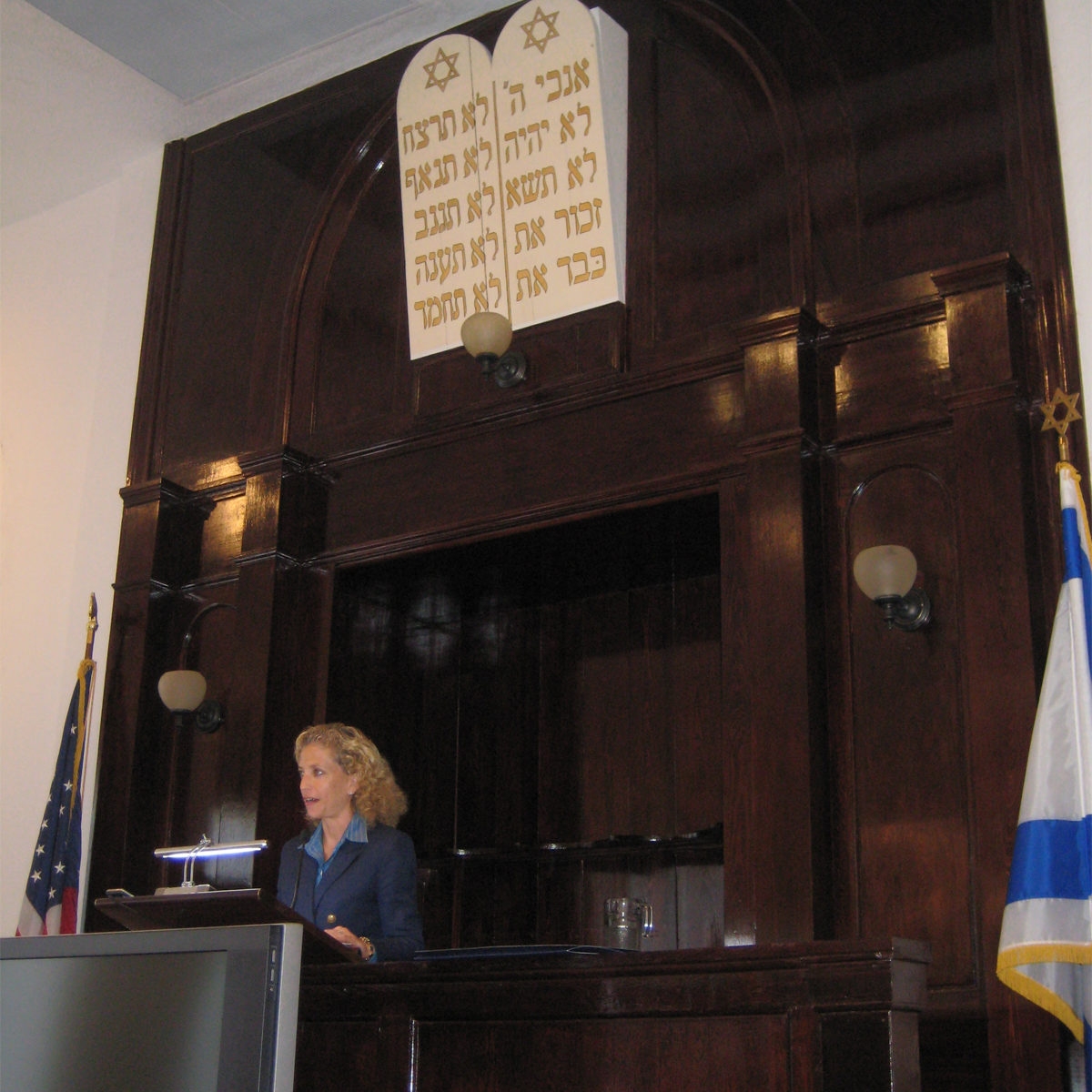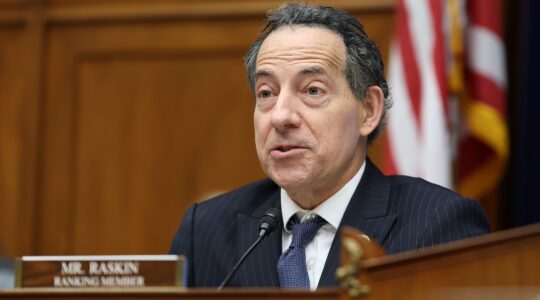WASHINGTON (JTA) – When does a bimah turn into a political soapbox?
The controversy last month over a Miami temple’s invitation and then disinvitation to Rep. Debbie Wasserman Schultz (D-Fla.) — which prompted the resignation of an influential congregant who also is a Republican activist — has revived with a new vehemence a question common in every election cycle: What are the appropriate parameters for political visits to houses of worship?
“It’s true, Debbie Wasserman Schultz is not only active in supporting Obama, she’s a candidate,” said Marc Stern, the American Jewish Committee’s associate general counsel. “But Debbie Wasserman Schultz is also a congresswoman and she is a sitting member of Congress talking about something pertinent to her duties and undoubtedly is important to many of her constituents in South Florida.”
Stanley Tate, a 63-year member of Temple Israel and a prominent local Republican and philanthropist, demanded the right to rebut Wasserman Schultz, who is also the chairwoman of the Democratic National Committee, in real time. Turned down, he quit the synagogue in disgust.
“The topic she had selected, U.S.-Israel relations, was a political topic,” he said. “It was a terribly wrong thing to have been done. They could have lost their tax status.”
The temple, fearing a reprise of a recent headline-making showdown between a Boca Raton temple and Jewish critics of Obama, disinvited Wasserman Schultz, postponed the session and instituted a new policy: No candidates would appear at its events during election season.
“We will continue to decline to have candidates speaking during active campaign periods,” Ben Kuehne, the temple’s president, told JTA.
But banning political speakers from the sanctuary “is not what Congress intended” when it shaped laws governing the status of 501©(3)s, the Internal Revenue Service term for tax-exempt nonprofits, Stern said.
Kuehne said he was not opposed to balancing Wasserman Schultz with an equivalent Republican speaker. Tate said that Kuehne’s objection was on Tate’s rebutting her in real time.
Tate, 85, quoted Kuehne in their back-and-forth as offering to invite Rep. Ileana Ros-Lehtinen (R-Fla.) or Sen. Marco Rubio (R-Fla.) to speak on the same topic at a similar time and place. By that time, however, Tate felt Kuehne had misled him, and quit.
Tate said when he first raised his objection, he was not aware that Kuehne had been active in Democratic Party politics and was a donor to Democratic candidates.
Kuehne, a legal adviser to Democratic nominee Al Gore’s team during the 2000 presidential election recount, would not describe his private conversations with Tate.
“We will continue to reach out to elected officials to help us with our social justice programming,” Kuehne said, referring to the rubric under which Wasserman Schultz was to have spoken.
That, however, will wait until after the election “because of heightened attention to the partisan politics,” he said.
Wasserman Schultz did not hold back on her characterization of the incident.
“It is unfortunate that some would allow politics to stand in the way of citizens’ ability to interact with their representative,” she said in a statement to the Miami Herald. The temple is just outside Wasserman Schultz’s district, although many of her constituents are members.
In a letter to the congregation explaining the decision, Kuehne cited an effort by some right-wing Jews to protest a speech by Susan Rice, the ambassador to the United Nations, at the B’nai Torah Congregation in Boca Raton earlier in the month. Officials of the congregation feared disruptions; the protesters said they were unfairly silenced.
That event, he wrote, “was met with heightened levels of protest and disruption that potentially imperiled the safety and security of the Temple and its congregants.”
B’nai Torah also decided not to host candidates for public office or their associates this election cycle.
For Kurt Stone, a political science professor at Atlantic and Florida International universities, the policy is akin to giving into bullies. He was once a congregational rabbi and now authors a liberal blog.
“There was a time in fairly recent memory when you could bring anyone to speak in your synagogue and talk on just about anything, and at least give the person the respect they deserve as a human being, a community leader and a fellow Jew,” he said.
The episode has left a marked impact on Lauren Trushin, a 16-year-old fan of Wasserman Schultz whose confirmation speech was to have coincided with the politician’s talk.
“What I learned from the member who made the threats is that some people consider personal political beliefs about how this country is run to be more important than the State of Israel, and that people who engage in bullying get their way when people don’t stand up to them,” she said in her May 25 speech, reported by the Miami Herald.
That aside, keeping politicians and public officials out of the synagogue is not good for the Jews, said Mark Pelavin, the associate director of the Reform movement’s Religious Action Center.
“It allows a heckler’s veto,” he said. “The notion we need to avoid speech that is controversial is troubling. That would leave out every haftarah portion and a good chunk of the Torah as well.”
The roles were reversed in 2004 when Jewish Republicans and Democrats did rhetorical battle over a speaker program by the Jewish Policy Center, an affiliate of the Republican Jewish Coalition. Democrats said the program, which featured conservative scholars, was poorly guised propaganda targeting Sen. John Kerry (D-Mass.), that year’s presidential candidate for the party.
In 2008, Democrats objected to an invitation by the Conference of Presidents of Major American Jewish Organizations to Sarah Palin, then the GOP vice presidential nominee, to speak at an anti-Iran rally, citing much the same reasoning Tate used in Miami: Political speech is by definition partisan, and requires balance. Democrats said Joe Biden, Palin’s counterpart at that time, had been invited, but with not enough notice.
The solution to partisan speech, AJC’s Stern said, is more speech from the other side. In the 2004 controversy, for instance, he said had the conservative scholars ventured into pro-Republican political speech synagogue officials only had to make it clear that they did not endorse it – and to invite the opposing view at a different time.
Jonathan Tobin, writing on the conservative Contentions blog hosted by Commentary Magazine, said the season should count out appearances by the likes of Wasserman Schultz.
“Synagogues and churches should stay away from allowing their services to be commandeered by partisans, especially during a presidential election in which the considerable Jewish vote in Florida may be up for grabs,” he said.
The rules for 501(c)(3) exemptions are fairly narrow and allow considerable leeway in such matters.
On its website, the IRS prohibits “contributions to political campaign funds or public statements of position (verbal or written) made on behalf of the organization in favor of or in opposition to any candidate for public office.”
However it exempts “voter education activities (including presenting public forums and publishing voter education guides) conducted in a nonpartisan manner.”
The key is “nonpartisan,” said Pelavin of the Reform movement. “You can’t invite a candidate for one office without inviting a candidate from the other side at as similar time,” he said. “It can’t be one side for Friday night services, and the other side for Thursday morning youth group.”
David Harris, the executive director of the National Jewish Democratic Council, said he advises synagogues that solicit his group’s services to make sure they hear the opposing side – whether in a face-to-face debate, or at a different time.
“It’s important there’s bipartisan balance throughout an election cycle,” he said.

Help ensure Jewish news remains accessible to all. Your donation to the Jewish Telegraphic Agency powers the trusted journalism that has connected Jewish communities worldwide for more than 100 years. With your help, JTA can continue to deliver vital news and insights. Donate today.






